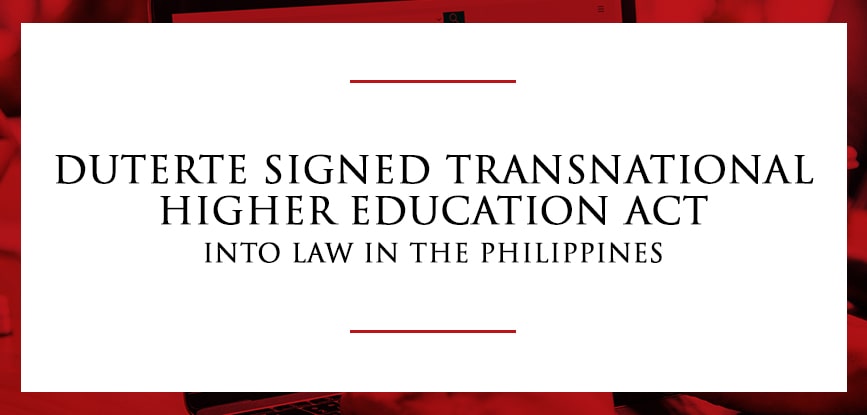
Duterte Signed Transnational Higher Education Act Into Law in the Philippines
President Rodrigo R. Duterte has signed into law Republic Act No. 11448, or the Transnational Higher Education Act, granting Foreign Higher Education Institutions (FHEIs) the opportunity to establish institutional services in the Philippines and collaborate with local universities.
The Transnational Higher Education Act (TNHE) allows FHEIs to establish branch campuses in the Philippines through a local partner university.
“The local branch shall be managed and administered jointly by the parties, subject to the provisions of the Constitution on control and administration of educational institutions. The local partner shall be accountable for ensuring the quality of the programs offered,” the law declared.
According to the new law, the ultimate purpose of bringing international standards and expertise to the Philippines is to modernize and make higher education in the country globally competitive. In the government’s hopes of drawing in more gifted students, faculty, and personnel — in a bid to enhance the country’s human resource base.
It further refers to TNHE to be “all types and modes of delivery of higher education study programs, sets of courses of study, or educational services, including distance education and study-abroad programs, which involve education system of a State different from the State where a TNHE provider operates or programs which may operate independently of any national education system where the learners are located in a country different from the one where the awarding institution is based.”
The TNHE is set to offer a variety of programs for undergraduate, graduate, and postgraduate degrees.
Higher Education Institutions (HEIs) may also provide specialized courses like Bachelor of Laws and Bachelor of Medicine locally, but this addition will strictly be upon the discretion of the Commission on Higher Education (CHED), relevant government agencies, and their stakeholders.
To get an endorsement to offer further special programs, all TNHE institutions will have to first present their complete curricula to CHED. The said government agency will then review the appeal and guarantee its compliance with international standards.
Only curricula that belong to the top 500 World’s Best Universities shall be acknowledged by CHED, exempt from complying with the agency’s educational standards, and given the authority to offer services in the country.
Meanwhile, Philippine HEIs with programs recognized by CHED may also offer services offshore provided that they preserve the reputation of the Philippines as a provider of quality higher education as well as abide by the laws, rules, and regulations of the host country.
